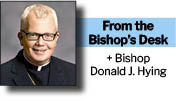
The United States Constitution guarantees religious freedom in the First Amendment.
This fundamental right propelled many persecuted religious groups in Europe (including the Catholics who settled Maryland) to come to America in pursuit of religious liberty — the ability to practice their own faith as their conscience led them.
Paradoxically, many of these groups did not grant the same freedom to those who believed differently than they did.
The Puritans controlled the Massachusetts colony and the Anglicans fined anyone who did not attend their church in Virginia.
On the other hand, William Penn of Quaker legacy and Lord Baltimore granted religious tolerance to everyone in their respective colonies of Pennsylvania and Maryland.
Today, some of our political leaders try to make a distinction between religious freedom and the freedom of worship.
While the right to worship God, as our conscience dictates, is an essential part of religious freedom, the latter is much more expansive in its meaning.
Religious freedom also includes the rights of conscience regarding moral issues, the ability to run religious institutions according to the teachings of one’s faith, and to be present and active in the public square, in order to contribute to the common good.
The Church here and around the world
The Catholic Church in our country has a noble and rich history of establishing and operating highly fruitful schools, hospitals, and charitable works.
The scope and depth of Catholicism’s contribution to the flourishing of the human person, especially the sick, poor, vulnerable, elderly, and young people are inestimable.
Religious freedom is a fundamental tenet expressed in the documents of the Second Vatican Council.
In Dignitatis Humanae, promulgated by St. Paul VI on December 7, 1965, the Church declares that religious liberty is intrinsic to the dignity of the human person and that no one can be coerced by the state or any other body to act against their conscience in religious or moral matters.
“This freedom from coercion is paired with a positive orientation to seeking and acting in accord with the truth. People have both a right and a duty to seek religious truth. Freedom from coercion allows the space for the pursuit of religious truth. Religious freedom requires that a society both refrain from preventing people from living out their religion and help create conditions for religious expression to flourish. As Pope Francis said in Cuba, the Church must have ‘the freedom and all the means needed to bring the proclamation of the Kingdom to the existential peripheries of society.’” [United States Conference of Catholic Bishops (USCCB) document on Dignitatis Humanae]
In its annual report on religious liberty, issued on January 16, 2024, the USCCB identified five principal areas of current concern: 1) Attacks against houses of worship; 2) The Section 1557 regulation from the U.S. Department of Health and Human Services which will likely impose a mandate on doctors to perform gender transition procedures and possibly abortions; 3) Threats to religious charities serving immigrants; 4) Suppression of religious speech on marriage and sexual difference; 5) The EEOC’s Pregnant Workers Fairness Act regulations, which aim to require religious employees to be complicit in abortion in an unprecedented way.
As you can see, some of these threats come from individuals, but, disturbingly, many come from the government, especially actions of the executive branch in the areas of human life and sexual identity.
The Catholic Church will always defend religious freedom, both for the individual and the community, as the foundation of all other freedoms, based on the inalienable requirement of the dignity of the human person, whose conscience is where God speaks to the most secret core and sanctuary of man — there he or she is alone with God. protected by our Constitution.
Facing and meeting challenges
Increasing threats to religious liberty around the world and here at home move us to pray and act to protect human dignity and the rights of religious entities and individual persons.
No one can be compelled to act against conscience, whether that is performing an abortion, prescribing abortifacients, assisting with transgender procedures, or fighting in active military combat.
Conscientious objectors have always been allowed to serve in a non-combatant way in the U.S. armed forces.
This question of religious freedom is important for us to ponder in light of the upcoming elections, along with the preeminent issue of abortion, as well as the flourishing of marriage and family, economic participation and the dignity of work, attention to the poor and vulnerable, human rights and care for creation.
I encourage everyone to read Faithful Citizenship and to vote, as we pray for our country and its leadership, that the truth of God’s law, written on the human heart, will be respected, protected, and lived.

